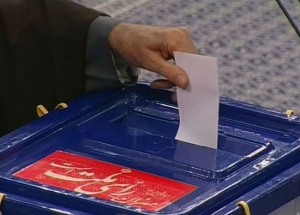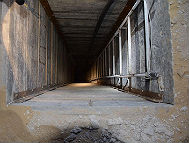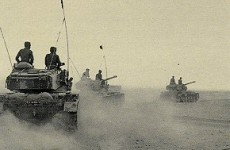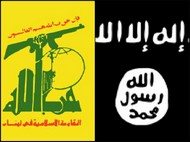
Talk about stacking the deck… all the ‘moderate’ candidates who won in the recent election were first evaluated by the all-powerful Guardian Council of ayatollahs. These fanatical Shiite clerics hold the real power in Iran. Just look at the figures – only 20% of the candidates were allowed to run for the Assembly of Experts, an upper House as it were. As for the Majlis, Iran’s parliament, only 7,000 of 12,000 candidates got the ayatollahs’ stamp of approval. Would you believe it? Even Hassan Khomeini, grandson of Ayatollah Ruhollah Khomeini, the father of the Revolution in 1979, was turned down because he was deemed not loyal enough! In other words, the Iranian politicians who were elected were all hand picked and judged to be loyal to the regime. So all the hoopla about a great victory by President Hassan Rouhani should be taken with more than a few grains of salt. Keep in mind that the Guardian Council of ayatollahs, which is in cahoots with the Revolutionary Guards, will still be calling the shots in Tehran when it comes to terror abroad and nuclear policy at home.
Prof. Eyal Zisser of Tel Aviv University says that those elected, even if they are committed to reform and change, are still the flesh and blood of the Islamic Revolution and have no intention of replacing it. At best, they wish to introduce alterations that will strengthen the theocracy. Moreover, the Revolutionary Guards who control the military and security forces see themselves as guardians of the revolutionary spirit, and if they feel Rouhani threatens it or their status, they will try to depose him.
It is also important to understand that there is a clear separation of functions between the Supreme Leader Grand Ayatollah Ali Khamenei and the Revolutionary Guards on one hand, and on the other Rouhani and his people. The reform camp of Rouhani is trying to advance moderate reforms at home and improve Iran’s image abroad. The ultimate goal is to boost the sagging economy and raise the standard of living for the Iranian people. Therefore, Rouhani is in charge of rhetoric and Iran’s image on the international stage. But it is Khamenei backed, by the power of the Revolutionary Guards, who rule the roost and will continue to determine Iran’s regional policy in the Persian Gulf, Iraq, Syria, and also toward Israel.
The conclusion to be drawn from all this is that even if there is now an undercurrent of historic change in Iran, it will remain beneath the surface in the coming years. The reality is that the Revolutionary Guards will set the tone in the nearby region that includes Syria, Lebanon and Gaza.
On the other hand, IDF Gen. (ret) Yaakov Amidror is a little more optimistic. The election of ‘moderates’ has improved the position of the less radical forces in Tehran. However, adding a note of caution, he agreed that the real moderates were not permitted to run in the election, only those whose loyalty to the regime was clear. The only real difference between the moderates and the regime is over the best tactics to achieve their common goal. In spite of this, could these more moderates be the harbingers of a dramatic change in Iran? The truth is that it is impossible to say, although it is also impossible to rule out a more optimistic prospect, even if the chances are slim.
That, in a nutshell, sums up Israel’s overall reaction. On the immediate operational level, Defense Minister Moshe Ya’alon has said that he is ‘very concerned’ that Iran will now reinforce its already considerable foothold in neighboring Syria. The easing of the economic sanctions on Iran will free up huge funds for Tehran to reinforce the Shiite axis in Syria, which includes Hezbollah fighters from neighboring Lebanon. The inflow of cash will also enable the Revolutionary Guards and the military to buy new weapons, develop new arms systems, and orchestrate terror attacks on Israel from the Golan Heights. Ya’alon presented his assessment to Italy’s visiting Defense Minister, Roberta Pinotti, who said the European states and the world at large were starting to understand the problems that Israel was facing (Daesh and other Islamist terrorism).
Israel seeking heavier bunker busters…
Meanwhile, Jerusalem is not sitting idle. Israel is seeking a new and larger military aid package from Washington, to replace the $3.1 billion dollars it has received annually. Most of this money returns to America in payment for weapons. Amir Rappaport, an Israeli commentator, has just disclosed that Israel is now seeking new and heavier bunker busters from America. In ‘Israel Defense’ journal, Rappaport wrote:
‘In addition to aircraft, Israel is talking to the U.S. about advanced air-to-ground missiles and weapons that will be needed greatly if it becomes apparent that Iran is duping the whole world by continuing to develop a nuclear weapon. What are involved are new bunker busters, and advanced and very heavy bombs that can penetrate bunkers. Five years ago, Israel received what are considered to be ‘light’ bunker busters’.
The Chairman of the U.S. Joint Chiefs of Staff, Gen. Joseph Dunford recently visited Israel for talks with his Israeli counter-part Gen Gadi Eisenkot and Defense Minister Ya’alon. Vice President Joe Biden is due to arrive on March 7th, and Rappaport speculates that he may be bringing news about the vital military aid package.




